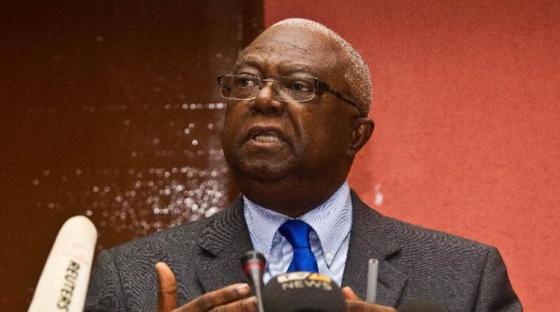Liberia: President Weah, Cummings Mourn Dr. Sawyer Death

Dr. Amos Claudius Sawyer.
President George Weah and Alexander Cummings of the opposition Alternative National Congress have joined hundreds of Liberians to mourn the loss of esteemed statesman and academic, Dr. Amos Claudius Sawyer.
Dr. Sawyer, a man whose unique vantage point of various dimensions of Liberian history might be a subject of study for years to come, died at the age of 76 on Feb. 17, barely four months after announcing his retirement from politics.
He died of cardiac arrest in Maryland, USA, having survived two brain surgeries. Dr. Sawyer had just returned from the hospital on Feb. 16 when, the following day, he took his last breath.
Memorializing Dr. Sawyer, President George Weah described him as a pillar of strength for Liberia's pro-democracy movement who contributed immensely to the peace that the country now enjoys.
"I fondly recall the opportunity he gave me to be an inspiration to many of Liberia's youth during the civil war when he appointed me as Sports Ambassador," the Liberian leader said, noting that Dr. Sawyer was a motivation to leaders in different spheres of life.
President Weah noted that Dr. Sawyer's footprints will remain etched in the story of the country for generations to come. He extended his sympathy to the bereaved family, particularly the widow of the late statesman, Mrs. Thelma E. Duncan Sawyer (also known as Comfort), who he regarded as a mother, urging them to take solace in the Lord.
In another moving tribute, opposition politician Alexander B. Cummings noted that Liberia has lost a great man and a respected friend in the person of Dr. Sawyer.
"Dr. Sawyer was one of Liberia’s premier citizens and someone whose counsel I regarded reliably. He was a teacher, an advocate, a politician, and a good human being," Cummings said. "Dr. Sawyer served our country as an interim president, representing Liberia with true distinction. Teresa and I are very saddened by the loss of the territory man, and extend heartbroken sympathy to his family, (especially his sons Reza and Frantz who are our cousins) as we lift them in prayers."
The ANC leader added that Dr. Sawyer's contributions at every stage of cementing and using democracy in this second republic can never be fully recounted.
Cummings further said that It is very important to note that his mentoring produced lots of very capable and successful Liberians, and his concern for the next generation was evident by the opportunities he provided for numerous young Liberians and therefore his legacy will live a long long time after him.
"Even as he rests amongst the greats, may our country continue to strive for the values of change and inclusive progressivism which his leadership style and life's works faithfully exemplified," he said. "Hopefully, our younger generation can use the life of Dr. Sawyer to serve as a guide for their understanding of commitment, patriotism, and nationalism."
Dr. Sawyer was a founding member of the Movement for Justice in Africa, a social justice organization that was very active in the 70s, and which is credited for raising the political consciousness of the population. Other contemporaries of MOJA included H. Boima Fahbulleh and Togba Nah Tipoteh.
Dr. Sawyer also served Liberia in many other capacities before his demise, including as Interim President, when warring factions controlled large swathes of territories. He helped organize many peace missions in and out of the country, which led to some cessation of hostilities. Before that, he was a renowned professor of political science at the University of Liberia and ran for City Mayor in 1979.
As an academic, he worked as a professor of political science at the University of Liberia. In December 1980, he was appointed Dean of the College of Social Sciences and acting director of the University.
Dr. Sawyer recently served as Chairperson of the Governance Commission that was established following the 2003 Comprehensive Peace Accord to recommend policies for reforming the public and security sectors, as well as the management of land in the aftermath of the civil war.
On a regional level, Dr. Sawyer served as Chairperson of the African Peer Review Panel of Eminent Persons, the body that actually conducts the peer review for the African Peer Review Mechanism (APRM). Founded in 2003, the APRM is a twin-organization with NEPAD, an economic development program of the African Union. NEPAD believes that it is critical that African development and regional cooperation programmes take place in the context of good economic and political governance; while the APRM is a mutually agreed programme, voluntarily adopted by Member States of the African Union, to promote and re-enforce high standards of governance. The peer review mechanism is a self-monitoring mechanism. At the end of Dr. Sawyer's term as chair of the Panel of Eminent Persons, 31 African countries had voluntarily become members of the APRM.
Born on June 15, 1945, to Abel and Sarah Sawyer, Amos already had in his genes the convergence of their values. He was named after his maternal grandfather, Amos; and given his father’s middle name, Claudius, after the Roman emperor. Abel Sawyer, Amos’ father, was a staunch catholic.
Dr. Sawyer has authored several academic books and is the recipient of the prestigious Gusi Peace Prize, given by the Gusi Peace Prize Foundation, based in Manila, Philippines. The Gusi Peace Prize is given to recognize individuals and organizations who contribute to global peace and progress through a wide variety of fields.
One of the legacy projects he was working on up to the time of his death is a series of civics books that the next generation of Liberians can use to strengthen their sense of citizenship and national direction. That project, thankfully, is in capable hands toward fulfillment.
Dr. Amos Claudius Sawyer is survived by his widow, children, and a host of other relatives, friends, and professional colleagues at home in Liberia and around the world.

